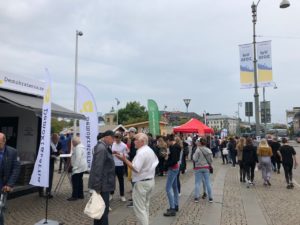Several international newspapers have taken an interest in the upcoming Swedish general election. Particularly the Swedish Democrats and their rise in popularity.

Campaign area in Gothenburg.
The last couple of years has seen a rise in prominence of far-right political parties and leaders across the globe. Victor Orban, Matteo Salvini, Marine Le Pen, Jaroslaw Kaczynski are only a few examples and then Donald Trump as the leader of the Republican party in the US was elected president.
Now, the time has come for Sweden to elect their new Prime Minister and recent international publications have started paying attention to the Swedish Democrats. The Guardian stated that the party has caused many to link immigration into violent crime, even though officials statistics show extremely weak connections. ”Mirroring gains made by the far-right parties in Italy, Germany, France, Austria, and the Netherlands, the Swedish Democrats plainly benefited from the 2015 crisis that overwhelmed social services and caused such fury that refugee accommodation centers were set on fire.”
Others write about the recent violent activities in Gothenburg with exploding hand grenades and burning cars as a free delivery of sympathy to the Swedish Democrats and the German newspaper Der Spiegel is seeing a trend amongst other parties recently switching into stricter views of immigration and refugees in order to reclaim voters they may have lost to the far-right.
“I don’t think it matters what a Columbian newspaper writes about Sweden or the election in Sweden.”
One leading Swedish Democrat does not view international press as something that affects the Swedish voters or their view on Swedish politics other than ”maybe those reading it”.
”I don’t read international press. What’s important for Swedish politics is what is published in Swedish newspapers. I don’t think it matters what a Columbian newspaper writes about Sweden or the election in Sweden.” Jörgen Fogelklou, group leader for Swedish Democrats in Gothenburg, says.
Down at the local campaign area in Gothenburg with all the party flags flying, the Social Democrats had a different opinion. ”On the contrary. I think the international press has an impact on the Swedish election because people do read other news papers. And they can hear and see what other media is saying about our country and our election” one of the campaign workers for Social Democrats says.
”When you have bad publicity in other media in other countries, I believe that you are more likely to vote for them because you don’t want your country to be dragged in the mud. In some ways the Swedish Democrats are doing that to Sweden in newspapers in other countries.” The campaign worker continued.
This notion is echoed internationally. The Argentinian newspaper Clarín said ”in spite of everything, the Swedish economy is doing well, but the smallest problems arise from immigrants and the Swedish Democrats have used it to their advantage.”
The Swedish general election is on Sunday September 9th and the ARD correspondent concludes that ”Sweden stands in the middle of a politically unstable time. The country will change.”







